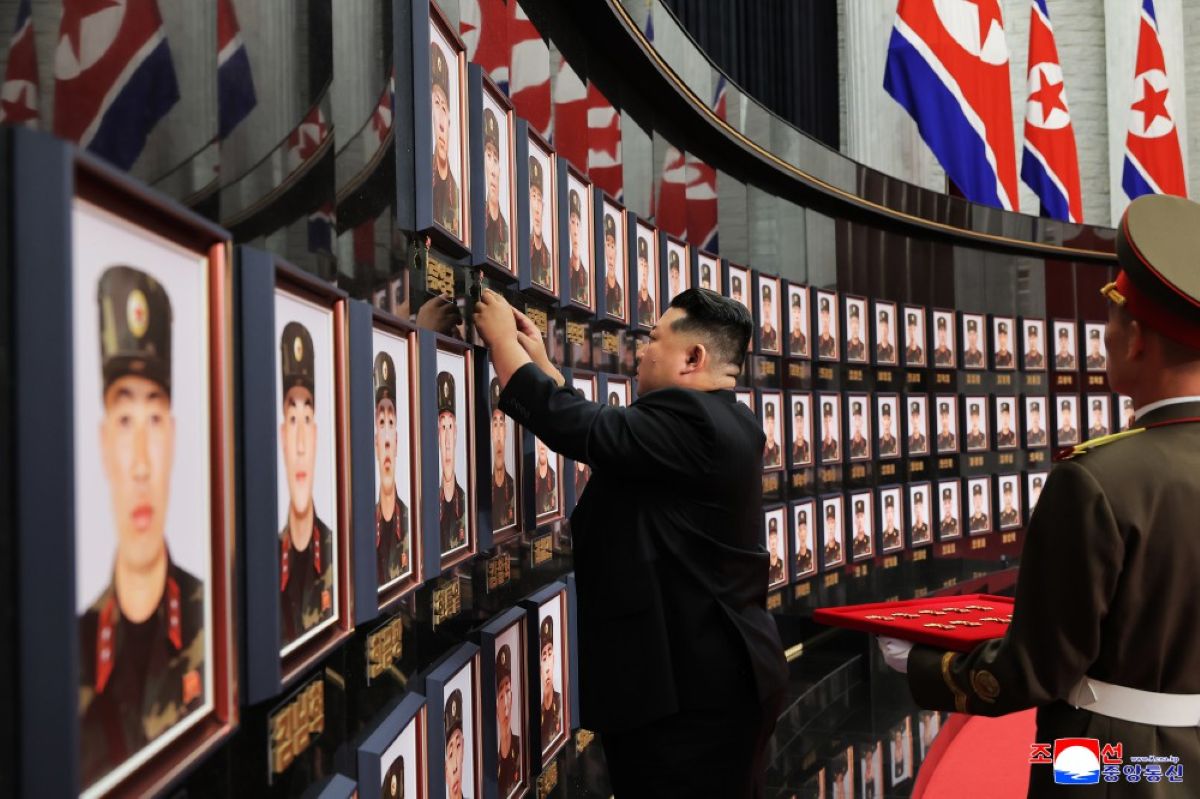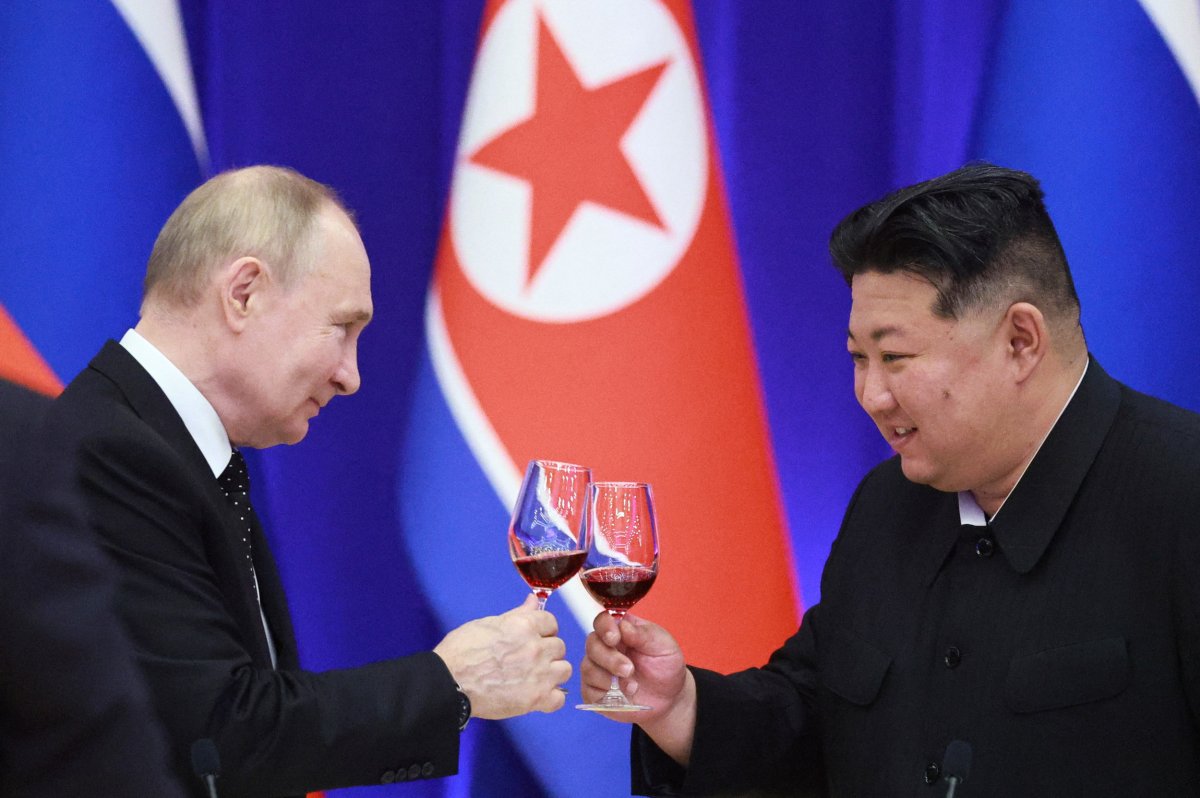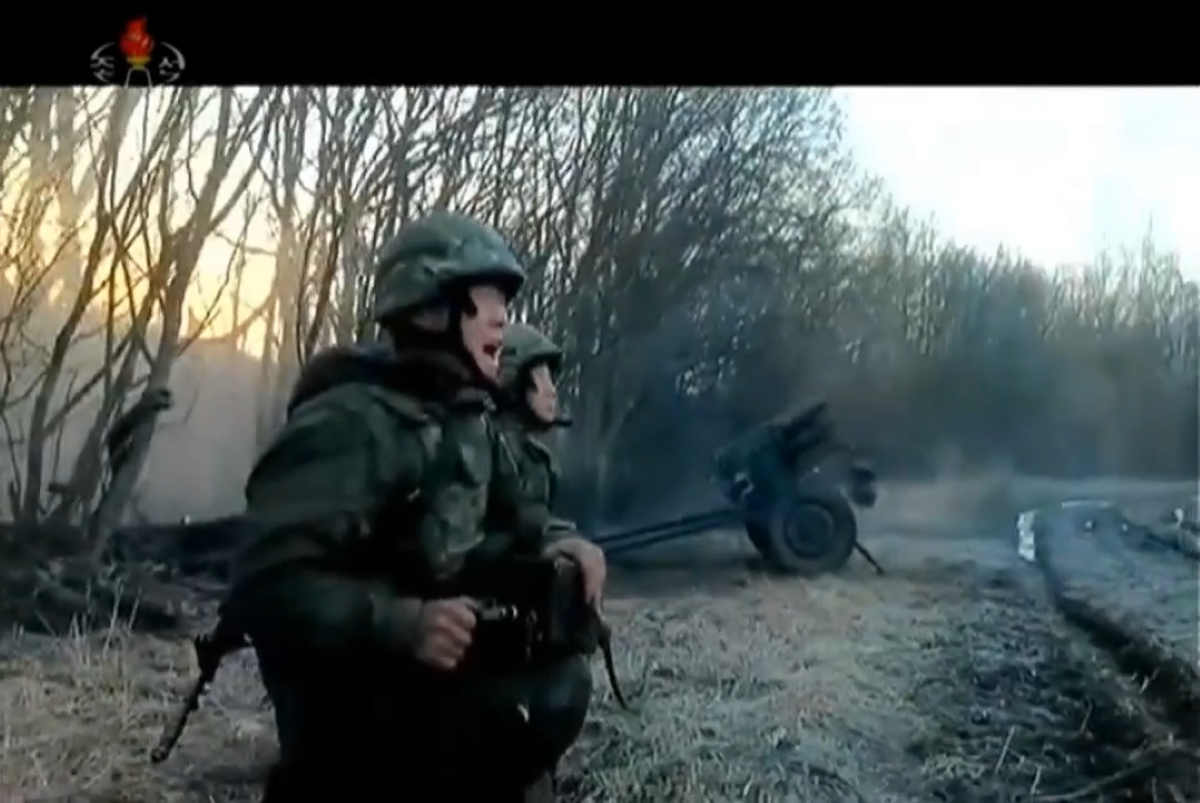
North Korea’s once-covert role in direct support of Russia’s war against Ukraine is now being embraced by the nation’s leadership, a shift that reflects emerging realities on the battlefield and in the world order to the benefit of Moscow and Pyongyang.
North Korean Supreme Leader Kim Jong Un‘s award ceremony and visit to a memorial to troops slain in action on Friday marked the latest step in a trend that began in April, when Pyongyang first acknowledged that it sent soldiers to aid Moscow in repelling a Ukrainian offensive in Russia’s Kursk region. That reveal took place some six months after intelligence from the United States and South Korea first assessed that North Korean forces had arrived in Russia.
Since then, the joint Russian-North Korean military operation has managed to retake much of the land considered a potentially key bargaining chip for Ukrainian President Volodymyr Zelensky as he hopes to reclaim at least some of the near-fifth of his country occupied by Russia in an eventual peace agreement.
For North Korea—officially known as the Democratic People’s Republic of Korea (DPRK)—which signed an unprecedented mutual defense treaty with Russia in June of last year, the gains fuel a narrative reminiscent of the partnership displayed between Moscow and Pyongyang during the Korean War that erupted eight decades ago.
“I think this reflects unfortunately the gains on the ground that Russian and DPRK troops have made in the Kursk territory,” Victor Cha, Korea Chair at the Center for Strategic and International Studies (CSIS), told Newsweek. “They have created a narrative of victorious allies and the first success of this newly rejuvenated military treaty relationship.”
“Initially, the progress was not apparent, leading the North Koreans not to disclose,” said Cha, who previously served in a number of U.S. government positions and represented the U.S. at the 2003-2007 Six-Party Talks that also included China, the two Koreas, Russia and Japan. “But now, they are crystal clear about their being in bed with the Russians.”
Korean Central News Agency
An Alliance Forged in Blood
While North Korea has widely been associated with its other great power neighbor, China—previously Pyongyang’s only treaty ally—the country’s relationship with Russia dates back even further. The Soviet Union oversaw the establishment of North Korea as a rival to U.S.-backed South Korea after the end of World War II, laying the grounds for one of the Cold War’s deadliest confrontations.
The USSR contributed relatively little in terms of combatants. But Moscow’s advisers, equipment and nuclear power status served as a major boost to North Korean and Chinese forces fighting South Korea and a U.S.-led coalition in a bloody conflict that ultimately ended in a 1953 stalemate and a lingering state of war no U.S. administration has managed to pacify.
In a letter sent to Russian Foreign Minister Sergey Lavrov earlier this week to mark the 80th anniversary of the Korean War, North Korean Foreign Minister Choe Son-hui described how “the DPRK people always remember the internationalist feats performed by the officers and men of the Red Army who shed their blood in the fight for Korea’s liberation.”
“She expressed belief that the strategic communication and concerted action between the foreign policy agencies for the permanent development of the alliance between the two countries will further grow and strengthen in the future, too, always remaining faithful to the inter-state treaty in conformity with the strategic plan and noble intention of the top leaders of the DPRK and Russia,” according to a North Korean Foreign Ministry readout published Wednesday.
Since coming to power in 2012, Kim has sought to emphasize ties with the Kremlin, where Russian President Vladimir Putin has ruled for a quarter of a century. Now that Russia has brought on a war across its own borders, North Korea’s call to arms marks a significant milestone in the relationship, constituting the first major active combat deployment of the Korean People’s Army since the Korean War.
It also speaks to what Cha described as North Korea’s “revisionist intentions—that is, it is not simply content to have its nuclear weapons and be left alone.” He added that the Moscow-Pyongyang axis was in some ways “more concerning” than the traditional China-North Korea alignment as Beijing traditionally exercised greater restraint in terms of military adventurism and nuclear activities.
“Moscow sees a transactional relationship where they get munitions and missiles and troops,” Cha said. “They pay the North Koreans in food, fuel, and weapons technology and they really do not care what the North Koreans do.”

Vladimir Smirnov/Sputnik/Pool/AFP/Getty Images
Kim’s Gambit
Jenny Town, senior fellow at the Stimson Center, where she also serves as director of the Korea Program and 38 North project, spoke of the “enormous opportunity” the expanded relationship with Russia has afforded North Korea.
These benefits range from “political standing to military modernization support to new levels of cross-border economic cooperation,” demonstrating “the outsized impact the small country can have on global security, elevating its role on the global stage,” Town told Newsweek.
Such benefits, she added, likely contributed to Kim’s decision to showcase rather than conceal North Korea’s contribution to the Russian war effort.
“The war isn’t over yet, but with greater visibility about the benefits of the bilateral relationship, it created an opening to admit to the domestic public, the depth of the military cooperation,” Town said.
“It helped to be able to present the information domestically as contributing to critical (battle) victory for Russia, helping frame North Korea’s sacrifices as contributing to that success,” she added. “It also now allows North Korea to honor those sacrifices, giving the fallen a hero narrative, helping to mitigate potential social disapproval of the situation.”
It’s a gamble unlike any North Korean leader has taken since Kim’s grandfather, founding Supreme Leader Kim Il Sung, first ordered his troops to cross the 38th Parallel, the hastily drawn post-WWII border that initially separated the two Koreas and from which their current armistice line, the Demilitarized Zone, lies not far.
North Korea did contribute to other Cold War-era conflicts against U.S.-backed forces, aiding fellow communists during the Vietnam War, supporting an Arab coalition against Israel and backing leftist African movements in the likes of Angola, Namibia and Zimbabwe but never as visibly or high-stakes as the deployment on the frontlines of the Russia-Ukraine war that has drawn the North Atlantic Treaty Organization’s (NATO) full attention.
And though the conflict has served as a catalyst for revamping Russia-North Korea ties, the broader trajectory was likely to outlast the war as Pyongyang also more broadly capitalized on Moscow’s challenge to the West.
“If and when the war ends, the intensity and nature of their bilateral cooperation, especially the build out of new areas, is likely to lessen,” Town said. “But in many ways, this relationship is increasingly being framed as a cornerstone of an anti-Western world order, meaning the underlying rationale for cooperation will persist.”

Korean Central Television
Tough Talks
The success of North Korea’s contribution to thwarting the Ukrainian incursion in Kursk also takes on a new light as President Donald Trump proposes “land swaps” as part of a settlement to end the over three-year war.
The proposal is part of the Trump’s accelerated efforts to resolve the conflict in recent weeks, having met with Putin in Alaska last Friday and then days later with Zelensky and European leaders at the White House on Monday. As he now seeks to arrange a direct meeting between the Russian and Ukrainian leaders, the loss of Ukrainian-held territory in Russia risks weakening Zelensky’s hand at a time when Russian troops have made gradual, yet steady, advances in eastern Ukraine.
Meanwhile, Trump’s face-to-face meeting with Putin, their first meeting in six years and Putin’s first travel to U.S. soil in a decade, bore some of the hallmarks of his historic debut summit with Kim, the first-ever between U.S. and North Korean leaders, at the start of an unprecedented peace process in 2018.
Those talks, which culminated in two more meetings, ultimately unraveled the following year, leaving tensions to fester on the Korean Peninsula. Kim and his influential sister, Korean Workers’ Party Publicity and Information Department Deputy Director Kim Yo Jong, have only hardened their rhetoric against South Korea in recent years, and the North Korean ruler has simultaneously doubled down on nuclear development.
These steps persisted as Trump recently ordered a direct attack on the nuclear facilities of Iran, another longtime U.S. foe and friend of North Korea. Observers told Newsweek at the time the strike was likely to only bolster Kim’s embrace of Russia and his own weapons of mass destruction.
As such, even with Kim Yo Jong notably avoiding direct criticism of Trump—recently referring to her brother’s relationship with him as “not bad”—Town said any deal preconditioned on North Korea abandoning its nuclear arsenal would be a non-starter.
“How the U.S. responds to that opening, though is unclear,” Town said. “If the policy remains centered on denuclearization (essentially hinging all aspects of the relationship on North Korea’s willingness to move toward nuclear disarmament), efforts to revive diplomacy will fail.”
